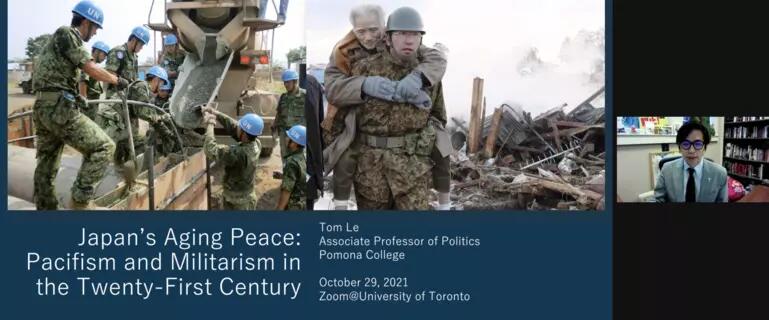
Event Report: Japan’s Aging Peace: Pacifism and Militarism in the Twenty-First Century
On October 29th from 3:00pm-4:00pm (EST) Tom Le, an Associate Professor of Politics at Pomona College and a research associate at the PRIME Institute at Meiji Gakuin University, delivered a talk about his recently published book “Japan’s Aging Peace: Pacifism and Militarism in the Twenty-First Century”.
Professor Le commenced his talk with a discussion of the regional politics that impact militarism and national security in Japan, with a focus on historical issues, North Korea, and the growing military power of China. In answering the book’s main puzzle - what determines the content and direction of Japanese security policy? - Le discussed the era of Proactive Peace under Shinzo Abe and argued that the “Interaction of material and ideational forces create constraints and restraints on bodies such as the Japanese Self Defence Forces", Le noted that Japan’s culture of anti-militarism is refined through time, experiences, and practices, with these variables coming together to form a political “anti-militarism ecosystem” as a result of changing perceptions of security across generations of Japanese citizens.
Le further explained that the country’s anti-militarism ecosystem is impacted broadly by societal, technical, and political factors that all contribute to why Japan has not remilitarized despite the changing international context it finds itself in both regionally and globally. Further breaking down his analysis in what he called Yonjin (Four Persons), Le discussed how the Japanese public prefer to avoid certain labels associated with death and destruction, and how Japanese companies do not see much potential in the arms sales. Professor Le also highlighted how Japan’s higher education attainment is reducing the pool of potential recruits that would be needed for a militarized society. The talk concluded with remarks about how Japan will continue to stand in defiance of the “normal nation” narrative found in the international relations literature, and how normative security beliefs are fundamental to understanding the perspective of Japanese policymakers.
Following the presentation, a lively question and answer period was moderated by Professor Phillip Lipscy, the Director of the Centre of the Study of Global Japan. Le answered questions concerning recent military developments in the Asia-Pacific region, the role of Japan’s large aging population in security decisions, and questions about the historical mobilization of Japan’s Self Defense Forces.
We would like to thank Professor Tom Le for sharing his important publication, as well as the virtual audience that was in attendance from around the globe for an engaged Q&A session

